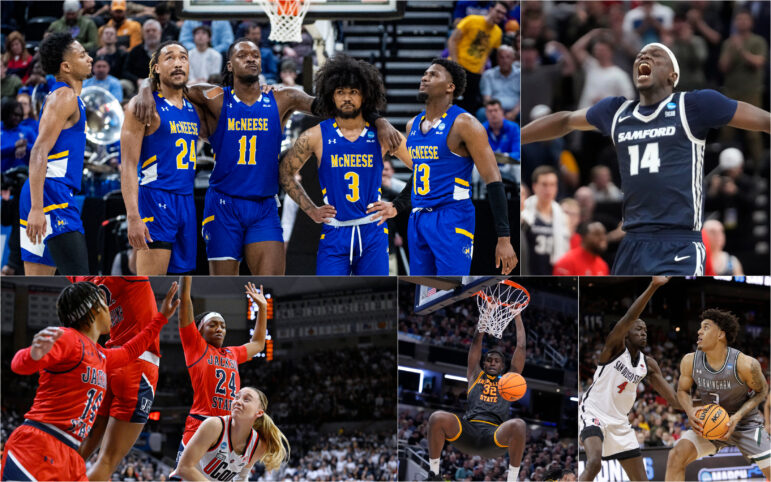March Madness is officially over following historic wins by the University of South Carolina and the University of Connecticut in the women’s and men’s NCAA basketball tournaments.
This season, 12 schools from across the Gulf South punched their ticket to the Big Dance, ranging from Power 5 powerhouses like the Alabama men’s team and the LSU women’s team to smaller, relatively unknown teams playing the role of the underdog.
In the women’s bracket, that included teams like the Jackson State Tigers, who have made the tournament in three of the past four seasons but had a tough first-round matchup against UConn’s women’s team.
On the men’s side of the field, some entered the tournament for the first time ever, like Grambling State, or after years-long absences, like McNeese State, the University of Alabama at Birmingham and Samford University.
All of these schools were eliminated in the first round, but making it to the tournament in the first place is an accomplishment that could have lasting impacts on the school on and off the hardwood.
The buzz around campus
Samford is a small Baptist university on the edge of Birmingham, Alabama, known for its liberal arts programs. But in recent years, the school has made a name for itself in athletics.
During the Bulldogs’ run to the NCAA Tournament, students could be seen walking around campus proudly wearing basketball jerseys and other paraphernalia. JD Roland, a freshman, said the feeling around campus was “electric,” after Samford clinched its first trip to the NCAA Tournament in more than 20 years.
“Everybody’s screaming at the top of their lungs. We’re so pumped about our school,” he said. “It’s been 24 years since we’ve made it to March Madness, and here we are.”
This excitement, however, didn’t happen overnight. Kennedy Russell, a junior, said she’s seen how campus interest in athletics has grown over the last few years.
“The energy has definitely grown a lot because we’re not really a sports school,” she said. “There wasn’t a whole lot of students coming to sporting events, so it’s definitely grown.”
For many prospective students, sports can serve as the introduction point to a university — the “front porch,” as Samford Athletic Director Martin Newman calls it. When a school like Samford makes it to a national stage against a perennial favorite like Kansas and puts up a hard fight, that front porch can get a lot bigger — win or lose.
“Most of the universities that you know something about, you probably have never been there,” said Darin White, Samford’s executive director of sports analytics. “You never visit the campus, but you know about them, primarily, through their sports programs.
“We’re already starting to see an increase in traffic to our website, and the number of students wanting to come visit campus.”
Investing in basketball
Similar to Samford, McNeese State University, of Lake Charles, Louisiana, this year’s appearance marked the first time the Cowboys qualified in two decades. Also like Samford, McNeese State lost its first-round game, falling to Gonzaga — though the 86-56 final score was not as close.
But don’t consider the Cowboys a Cinderella story. According to McNeese State Vice President Wade Rousse, the men’s basketball team’s success was planned, starting with the headline-grabbing hire of former LSU head basketball coach Will Wade to lead the program.
“It was an intentional effort to invest in basketball,” Rousse said. “We had a wonderful year. The student body got really involved [and] sold out every game toward the end of the season.”
Rousse said McNeese State has worked hard to get back on its feet after Hurricane Laura devastated the Lake Charles community in 2020, and making the tournament is seeing the fruit of the university’s labor. Even with the first-round loss, the school has already seen an immediate groundswell of support.
“I certainly notice it, around town, there’s a sense of pride,” Rousse said.
The next step for the Cowboys, Rousse said, is to take the exposure from the national spotlight to keep McNeese growing, and make another run at the tournament next year. He also hopes their sports programs can have a “Saban effect” for the school, similar to what the University of Alabama experienced.
“I’m not naïve enough to think that one shot can get that done,” he said. “But if we can continue to capitalize on this two, three, four years in a row, I absolutely believe you’ll see a positive effect on enrollment.”
This story was produced by the Gulf States Newsroom, a collaboration between Mississippi Public Broadcasting, WBHM in Alabama, WWNO and WRKF in Louisiana and NPR.

